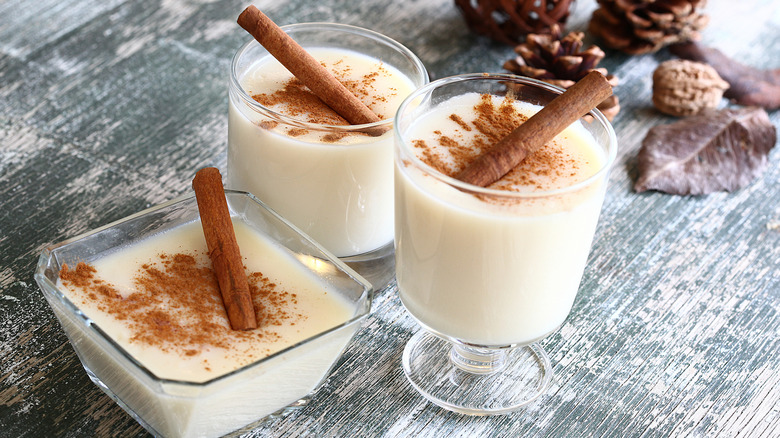Yes, You Can Age Eggnog — Here's How To Do It Safely
Eggnog is a real sign that the winter holidays are upon us — as soon as supermarkets start moving those bottles front and center in the dairy aisle, you know you're going to start hearing Christmas jingles. It seems to be one of those beverages that you either love or hate and, if you love it, you should try making it at home. And just one of the ways you can make your 'nog taste better is to age it.
Whoa, whoa, whoa — age a mixture of eggs and assorted dairy products? According to Natalie Migliarini, the founder of Beautiful Booze, author, creator, and social media influencer, one of the most important factors in safely aging eggnog is making sure that the ABV is above 20%. That means no matter what alcohol type you use, whether it's rum, brandy (a nice Cognac wouldn't go amiss), bourbon — or a Martha Stewart-style mixture of all three — they should be around 80 proof, meaning the spirit has a 40% ABV.
Migliarini cautions that, when aging eggnog, "you have to pay attention to preparation methods by making sure you have everything stored in airtight and sterilized containers." You must also consider the period of time you leave the eggnog to age. Three weeks is the minimum to let it sit in your fridge before you can try your glorious creation.
How does all this make aged eggnog safe?
Aged eggnog is safe to consume because the alcohol effectively kills any salmonella that might be lurking in the raw egg — but only after a certain amount of time, which is why you must wait three weeks. In a famous experiment at Rockefeller University in 2010, scientists actually made eggnog, added salmonella to it then tested it multiple times across the following few weeks. The first two tests revealed significant amounts of salmonella still in the beverage, while at the three-week marker, the 'nog was deemed bacteria-free, with the salmonella eradicated.
It's also worth mentioning that the scientists definitely refrigerated their eggnog, just as you should when making it at home. Natalie Migliarini points out that homemade eggnog "should last a couple of months in the refrigerator." This is because, while the alcohol kills any dangerous pathogens in the eggs, keeping it cold also inhibits bacterial growth from outside sources.

